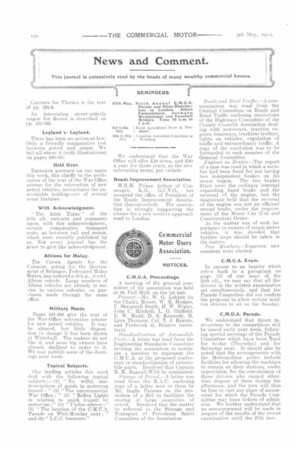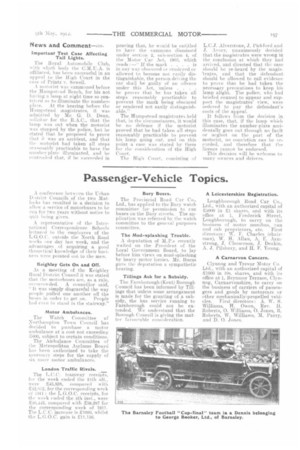News and Comment.
Page 10

Page 11

If you've noticed an error in this article please click here to report it so we can fix it.
This journal is extensively read by the heads of many wealthy commercial houses, Carriers for Florists is the text of pp. 198-9.
An interesting street-orderly wagon for Rouen is described on pp. 192-19:3.
Leyland v. Leyland.
There has been no action-at-law. Only a. friendly comparative test between petrol and steam. We tell all about it (with illustrations) on pages 190493.
Held Over.
Excessive pressure on our space this week, due chiefly to the publication of the text of the War-Office scheme for the subvention of new petrol vehicles, necessitates the unavoidable holding-over of several usual features.
With Acknowledgment.
"The Irish Times" of the 2,1th ult, extracts and comments upon, with due acknowledgment, certain comparative transport costs, as between rail and motor, which were recently published by us. Not every journal has the grace to give like acknowledgment.
Albions for Malay.
The Crown Agents for the Colonies, acting for the Government. of Selangor, Federated Malay States, has ordered a 16 hp., 40-cwt. Albion vehicle. Large numbers of Albion vehicles are already in service in various colonies, on purchases made through the same office.
Military Needs Pages 201-206 give the text of the War-Office subvention scheme for new petrol vehicles. It may be altered, hut little disposition to change it has been shown at. Whitehall. The makers do not like it, and sonic big owners have already declined to order to it. We may publish some of the drawings next week.
Topical Subjects.
Our leading articles this week deal with the following topical subjects :—(1) " No wilful misdescriptions of goods in motorvan transit : " (2) "The uncommercial War Office ; " (3) " Reflex Lights in relation to quick transit by motarvan :" (4) " Undue silence ;" (5) " The location of the C.M.U.A. Parade on Whit-Monday next ; " and (6) " L.C.C. tramcars." We understand that the War Office will offer S.:50 down, and £20 a year for three years, as the new subvention terms, per vehicle.
Roads Improvement Association.
H.R.H. Prince Arthur of Connaught, K.G., G.C.V.O., has accepted the office of President of the Roads Improvement Association (Incorporated). The association is strongly supporting the scheme for a new western approach road to London.
C.M.U.A. Proceedings.
A meeting of the general committee of the association was held at 89, Pall Mall, on the 1st inst.
Present.—Mr. W. G. Lobjoit (in the Chair), Messrs. W. M. Hodges, E. Shrapnell Smith, H. W. Wigan, John C. Mitchell, L. G. Oldfield, E. W. Rudd, D. S. Kennedy, 11. Lyon Thomson, Col, T. J. Kearns, and Frederick G. Bristow (secretary).
Standardization of Antonwb.ile Parts.—A letter was read from the Engineering Standards Committee inviting the association to nominate a member to represent the C.M.U.A. at the proposed conference re standardization of automobile parts. Resolved that Captain R. K. Bagnall-Wild be nominated.
Storage of Perol.—A letter was read from the R.A.C. enclosing copy of a letter sent to them by Mr. Inglis Parsons re the promotion of a Bill to facilitate the storing of large quantities of netrol. Resolved that the matter be referred to the Storage and Transport of Petroleum Spirit Committee of the Association Roads and Road 'Prof/ie.—A communication was read from the Central Committee on Roads and Road Traffic enclosing resolutions of the Highways Committee of the County Councils Association dealing with motorcars, traction engines, tramways, trackless trolleys,
lights on vehicles, regulation of traffic and extraordinary traffic. A copy of the resolution was to be forwarded to each member of the General Committee.
Engines as Brakes.—The report of a case was read in which a mem
ber had been fined for not having two independent brakes on his steam wagon. The two brakes fitted were the ordinary internal expanding band brake and the reversal of the engine, but the magistrate held that the reversal of the engine was not an efficient second brake, under the requirement of the Motor Car (Use and Construction) Order. As the matter was of such importance to owners of steam motor vehicles, it was decided that further steps should be taken in the matter.
Sew lire117.be,TS.—FOUrteen new members were elected.
C.M.U.A. Exam.
In answer to an inquiry which refers back to a paragraph on page 157 of our issue of the 25th ult., we may say that all the drivers in the written examination sat simultaneously, and that. the Parade Committee did not confirm the proposal to allow certain mailvan drivers to sit on the Sunday.
C.M.U.A. Parade.
We understand that direct instructions to the competitor's will be issued early next week, following special meetings of the Parade Committee which have been Iixed for to-day (Thursday) and for Saturday next. It should also be noted that the arrangements with the Metropolitan police include facilities for allowing the. machines to remain on their stations, under superyision,-for the convenience of those drivers who cannot. otherwise dispose of them during the afternoon, and the men will thus be free to visit any place of amusement for which the Parade Committee may issue tickets of admission. We further understand that no announcement will be made in respect of the results of the recent examination until the 27th inst.
Important Test Case Affecting Tail Lights.
The Royal Automobile Club, with which body the CM. U. A. is affiliated, has been successful in an appeal to the High Court in the ease of Printz V. Sewell.
A motorist was summoned before the Hampstead Bench, for his not having a lamp at night time so connit ed as to illuminate the number
plate. At the hearing before the Hampstead inagistrates, itwas admitted by Mr. a D. Dean, solicitor for the R.A.C., that the lamp was out when the motorist. was stopped by the police, but he stated_ that he proposed to prove that it was an accident, and that the motorist had taken all steps reasenably practicable to have the numher-plate illuminated, and he contemied that, if he succeeded in
proving that, he would be entitled to have the summons dismissed under section 2, sub-section 4, of the Motor Car Act, 1903, which reads :—" If the mark . . .
in any e ay obscured or rendered or allowed to become not easily distinguishable, the person driving the car shall be guilty of an offence under this Act, unless . . . . he proves that he has taken all steps reasonably practicable to prevent the mark being obscured or rendered not easily distinguishable."
The Hampstead magistrates held that., in the circumstances, it would be no defence if the motorist proved that he had taken all steps reasonably practicable to. prevent his lamp going out, and on this point a ease was stated by them for the consideration of the High Court.
The High Court, consisting of L.C.J. Alverstone, J. Pick ford and J. Avory, unanimously decided that the magistrates were wrong in the conclusion at which they had arrived, and directed that the case should be re-heard by the magislrates, and that the defendant should be allowed to call evidence to prove that he had taken the necessary precautions to keep his lamp alight. The police, who had briefed counsel to appear and support the magistrates' view, were ordered to pay the defendant's costs of the appeal. It follows from the decision in this case, that, if the lamp which illuminates the number-plate accidentally goes out through no fault or neglect on the part of the motorist, no conviction can be recorded, and therefore that the licence cannot be endorsed.
This decision will be welcome to many owners and drivers.
























